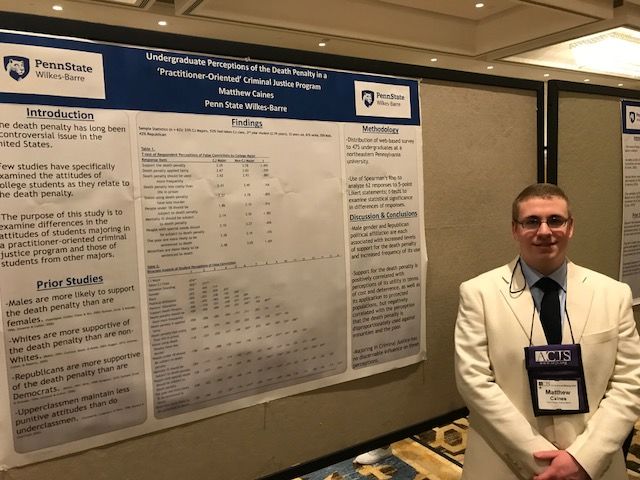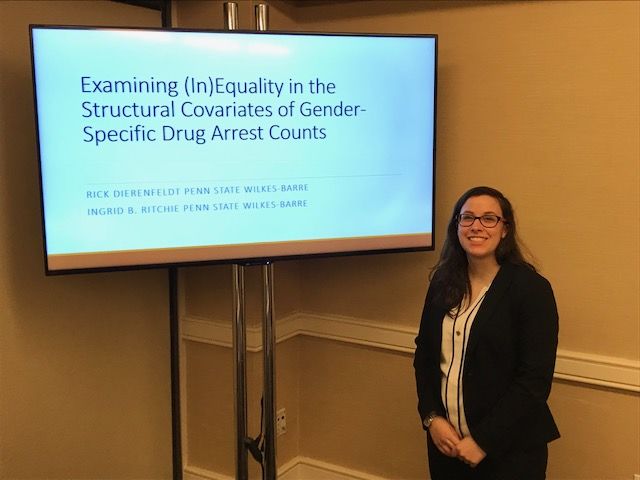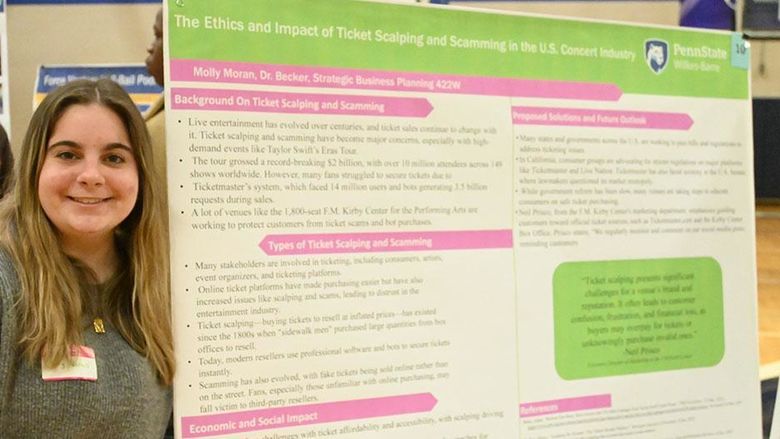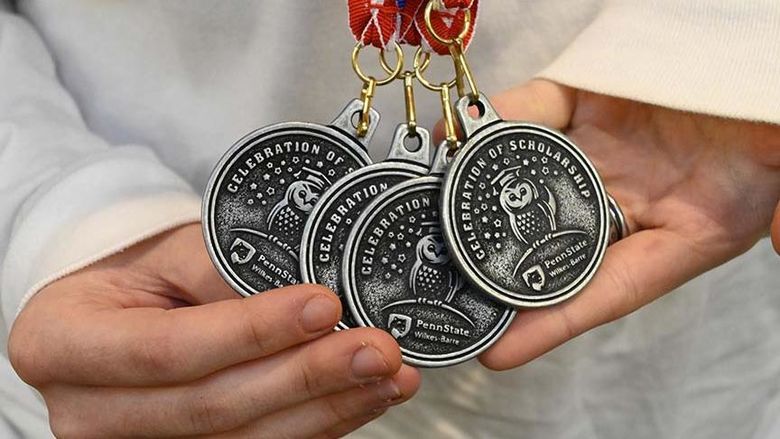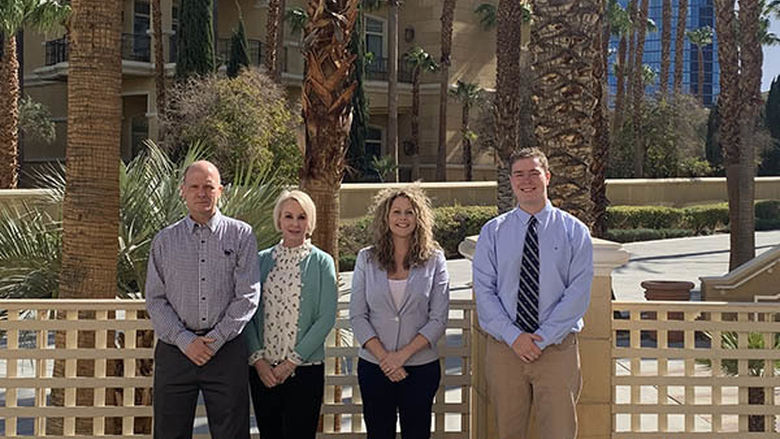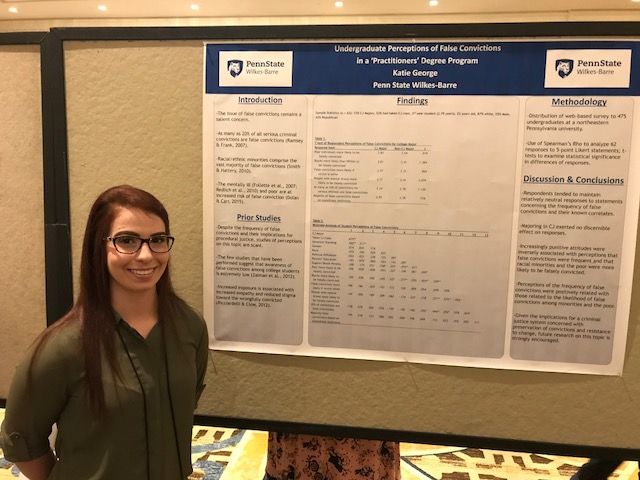
Katie George, from Penn State Wilkes-Barre, was one of the undergraduate presenters at the Academy of Criminal Justice Sciences meeting in New Orleans.
Rick Dierenfeldt seems to enjoy putting his academic peers in a state of disbelief.
Earlier this month, Dierenfeldt traveled to New Orleans for an Academy of Criminal Justice Sciences annual meeting with three undergraduate students, who he said continually wowed other conference goers with the quality of their research and abilities as students.
Dierenfeldt is an assistant professor in administration of justice at Penn State Wilkes-Barre. He and Melisa Naylor, lecturer and program coordinator in the rehabilitation and human services program, presented three papers there along with Samantha Bilardi, Matt Caines and Katie George, all undergraduate students within the AOJ department.
“Each presentation was met with positive feedback from session attendees,” Dierenfeldt said, just after arriving home from New Orleans. “In fact, no one we spoke with could believe that Matt, Katie and Samantha were undergraduate students. This was a consistent theme throughout the conference and it is apparent that what we are doing at Penn State Wilkes-Barre is raising the bar in undergraduate education and research.”
From Feb. 13-17, Dierenfeldt said his students had the opportunity to network with their peers and even meet giants in the field of criminal justice research. Those peers were often graduate students and educators.
Caines’ paper focused on perceptions of the death penalty in a practitioner-oriented criminal justice program. Dierenfeldt said they found no statistically significant difference in support for the death penalty between criminal justice and non-criminal justice students.
“We did find, however, positive and statistically significant relationships between support for the death penalty and support for the use of the death penalty in cases involving juvenile defendants, defendants who were people with special needs, defendants who were mentally incompetent, and defendants who were mentally ill. Similarly, increased support for the death penalty was associated with diminished perceptions that the death penalty is used disproportionately against minorities and the poor.”
George’s paper examined the perceptions of false convictions. Again, the study revealed no statistically significant differences between criminal justice students and non-criminal justice students in terms of perceptions of the frequency of false convictions or the degree to which minorities, the poor, the mentally incompetent or the mentally ill are falsely convicted.
“We did find, however, that respondents who believed false convictions are relatively common were more likely to believe that minorities, the poor, the mentally incompetent, and the mentally ill are more likely to be falsely convicted.”
Both Caines and George presented with Dierenfeldt as a co-author.
Dierenfeldt, Naylor and Bilardi presented a multi-level study of sexual victimization, which took data from the National Incident-Based Reporting System in conjunction with contextual-level data from cities where incidents took place to examine the influence of weapon use, victim-offender familiarity and offender intoxication on victim injury.
"At the end of my own career, I think I will be remembered less for anything I’ve published than I am for the prominent criminologists I mentored as students — and I’m OK with that.”
— Rick Dierenfeldt, assistant professor, administration of justice
Dierenfeldt said a professor from Texas was impressed that the seniors were able to complete an original research project in the span of a year. He explained how the department’s restructuring of CRIMJ 240 W Field Research, and CRIMJ 494 Research Topics allowed for such possibilities.
“Matt, Katie and Sam were excellent ambassadors of the AOJ program and Penn State,” Dierenfeldt said. “I could not have been more proud of their efforts or how they conducted themselves.”
It’s but the latest in a narrative of success for the administration of justice program at Penn State Wilkes-Barre. In November, Dierenfeldt and other researchers presented two papers at the American Society of Criminology in Philadelphia.
Ingrid B. Ritchie, an undergraduate student, and Dierenfeldt authored a paper titled “Examining (In)Equality in the Structural Covariates of Gender-Specific Drug Arrest Counts,” which looked at gender-based disparities in drug arrests.
Caines and Dierenfeldt, along with Sam Houston State University graduate student Joshua Shadwick, presented “Re-Framing the Ferguson Effect: Strain and Intra-Racial Violence in the Age of the New Media.” This analyzed intra-racial violence as a consequence of perceived and real mistreatment by the criminal justice system and the effects of borderless media communication.
Caines was also selected by the ASC to serve as the panel chair for the session in Philadelphia, a rare honor for an undergraduate.
Dierenfeldt said these conferences are invaluable in providing academic networking opportunities for students. Though it could be exhausting for the educators, there’s also an uplifting payoff.
“That’s the short game,” he said of the networking. “The long game will be measured in terms of their future contributions to the discipline and society … My job is to identify those students who exhibit the potential to succeed in academia, develop their skill sets, build their academic networks, and hand them off to graduate faculty who can take them to the next level. At the end of my own career, I think I will be remembered less for anything I’ve published than I am for the prominent criminologists I mentored as students — and I’m OK with that.”
Those interested in learning more about the administration of justice program at Penn State Wilkes-Barre can find more information on the program's website. A number of other Penn State campuses also offer administration of justice programs. For more information, visit the Bulletins website.
The Research Opportunities for Undergraduates program is part of Penn State Undergraduate Education, the academic administrative unit that provides leadership and coordination for University-wide programs and initiatives in support of undergraduate teaching and learning at Penn State. Learn more about Undergraduate Education at undergrad.psu.edu.
